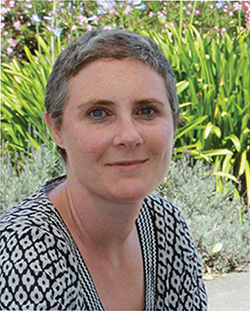Advanced Breast Cancer Survivor
Never Underestimate the Power of Support

When 37-year-old Laura Holmes-Haddad was diagnosed with Stage IV inflammatory breast cancer in 2012, she knew the clock was ticking. She was forced to make decisions fast, without much experience or information. With the help of a trusted medical team and a strong family who was willing to advocate for her, she beat the odds. Laura’s cancer road trip was, and still is, challenging, but she knows sharing what she learned will help other survivors as they navigate the intense world of cancer.
A few weeks before Thanksgiving, just after I stopped nursing my son, I felt pain in my left armpit and chest. After noticing redness in my left breast, I saw my general practitioner. Thinking it might be mastitis, she prescribed antibiotics and referred me to a breast surgeon. A week later I saw the surgeon, who ordered a biopsy, mammogram and ultrasound.
The day after Thanksgiving, the pain worsened. I left a message with the surgeon’s office for more pain medication. She was out of town but called back right away. She asked if I was sitting down then told me I had breast cancer. She said to get to the hospital immediately and possibly start chemotherapy that day. It didn’t quite register, but I shifted into gear. I called my sister, packed a bag, and asked my mom to take care of our kids, Penelope (4) and Roman (14 months). My husband, Munir, and I went to the hospital. After two days of tests, we learned the cancer had spread to 14 lymph nodes on the left side of my chest and five on the right. A scan also revealed an 11-centimeter tumor in my left breast. The tumor was sitting on nerves, which explained my extreme pain. They said I had Stage IV inflammatory breast cancer (IBC), a rare and aggressive type.
It was so hard for me to leave the kids, but my sister, husband and I flew to another cancer center for a second opinion. The oncology team found another affected lymph node in my clavicle, confirmed the IBC diagnosis and gave me a prognosis of 3 to 5 years. Because the tumor was too big for surgery, they suggested chemotherapy. We sought a third opinion. All three diagnoses and recommended protocols were the same, so I started chemotherapy at my local cancer center. Before my second cycle, I noticed a red bump on my breast. My oncologist canceled my next round, patted me on the back and told me there was nothing they could do.
Dumbstruck, I went back to the center where I’d gotten a third opinion. The oncologist said my only option was a clinical trial. My doctor found two clinical trials, but both were closed. Luckily, my family contacted the clinical trial sponsor to apply for a “compassionate waiver” for one of the trials. After my dad, sister and others sent more than 60 emails and letters, my appeal was granted.
The clinical trial regimen included a PARP inhibitor approved for ovarian cancer, along with two chemotherapy drugs. For six months, I flew to Los Angeles weekly for treatment, amid intense “mom guilt.” Our health insurance was through Munir’s job, so he continued working but I couldn’t travel alone so someone always had to travel with me. Sometimes we flew in and my blood counts were too low for treatment, so we’d reschedule our flights, hoping they would increase. Friends donated airline miles and hotel points, and one hotel offered discounts. We now know about resources to defray the cost of treatment-related travel, but back then we were focused on saving my life.
The treatment shrank the tumor to 5 cm. I stopped chemotherapy and had a 13-hour non-skin sparing double mastectomy and salpingo-oophorectomy. The 19 remaining lymph nodes were removed. My test results came back with clear margins. Recovery was painful, but I met my goal of walking Penelope to her first day of kindergarten.
Next I started radiation, which took its toll on me, followed by physical therapy and breast reconstructive surgery. Midway through radiation, I restarted the trial drug, taking eight capsules daily. It made me nauseated and extremely fatigued. Almost a year later, my oncologist told me my scans and bloodwork were clean. I could stop taking the trial drug.
After slogging through treatment, I am able to celebrate survivorship. I participated in a fundraiser for a local breast cancer organization, “To Celebrate Life.” Their yearly fashion show features cancer survivors as models. We learned how to walk on the catwalk, and they made us feel beautiful. As patients, we often lose our sense of self, becoming merely patients; Now we were women again.
I’m off all medications now, except for hormone therapy, and I mostly feel good. I have highs and lows, and I get “scanxiety” before my annual scans. I am much more patient and compassionate, and my empathy for others is off the charts. I am training as a peer mentor at Bright Pink, an advocacy group for breast and ovarian cancer. I want people to know how important it is to have someone advocate for you and listen to you without judgment. I hope my experience offers you hope and strength.


